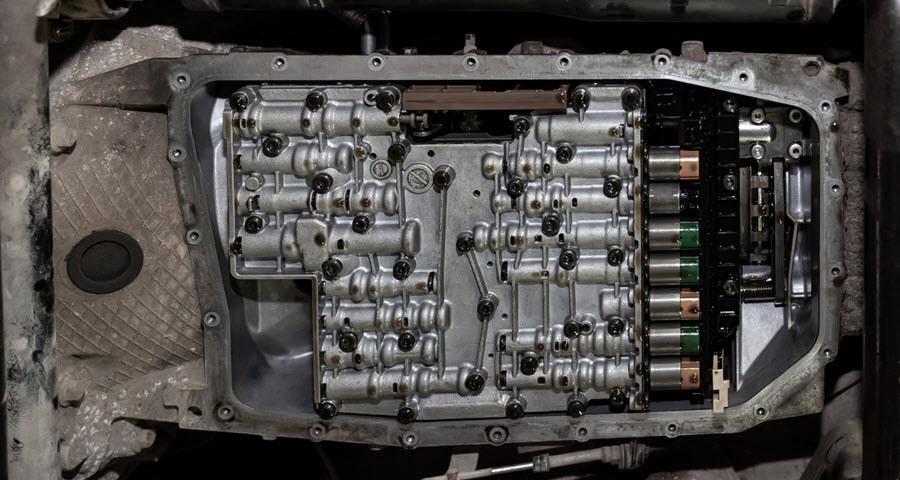Is it possible for a Porsche’s transmission valve body to experience a ‘midlife crisis’? It might sound unusual, but this question opens the door to a fascinating aspect of automotive engineering that affects Porsche owners more than they might realize.
The transmission valve body is the central control hub of the transmission system. It plays a pivotal role in regulating hydraulic fluid flow, directing the transmission of power from the engine to the wheels. In a Porsche, this component is designed to perform with remarkable precision, enabling seamless gear shifts, optimal fuel efficiency, and the characteristic Porsche driving experience. However, several factors can contribute to its failure:
Heat and Wear
Porsche vehicles are known for their high-performance capabilities, and with power comes heat. The transmission valve body is exposed to intense heat generated during spirited driving, and this can accelerate wear and tear on its components. Over time, the gaskets, solenoids, and valves within the valve body can deteriorate, leading to a drop in performance and eventual failure.
Contaminated Fluid
Transmission fluid acts as both a lubricant and a coolant for the valve body. Contaminated or deteriorating fluid can carry debris and foreign particles that clog the fine passageways within the valve body. This can hinder the smooth operation of the transmission and lead to shifting problems.
Electrical Issues
Modern Porsche vehicles are equipped with intricate electronic systems that control the transmission. Malfunctions in these systems, including the transmission control unit (TCU), can disrupt the valve body’s ability to function correctly. Issues with wiring, sensors, or software glitches can all contribute to valve body failure.
Watch for These Signs of Valve Body Failure in Your Porsche
- Delayed Shifting: Delayed shifting is a common early symptom of valve body issues. When you want to change gears, there might be a noticeable pause before the transmission responds. This delay can be particularly noticeable during acceleration or deceleration. For instance, when you step on the gas to accelerate, you might feel a lag before the car downshifts to provide the necessary power.
- Harsh Shifting: On the flip side, harsh or abrupt shifting is another telltale sign of valve body problems. Instead of smooth and seamless gear changes, you may experience a jolting or rough transition between gears. This can be uncomfortable for both you and your passengers and can potentially cause additional stress on the transmission, which may lead to further damage over time.
- Strange Noises: Unusual noises coming from the transmission can be a clear indication of valve body trouble. These noises can manifest in various ways. The specific noise you hear may depend on the nature and severity of the valve body issue. Whining noises might indicate issues with fluid pressure or hydraulic components.
Preventing Valve Body Failure
One of the most crucial steps in preventing Porsche transmission valve body failure is adhering to a regular maintenance schedule. This involves not only changing the transmission fluid but also replacing the transmission filter and conducting thorough inspections. Here’s why each of these maintenance tasks is vital:
- Fluid Changes: Transmission fluid serves several functions, including lubrication, cooling, and hydraulic pressure. Over time, this fluid can break down, become contaminated, or lose its properties. Regularly changing the fluid helps ensure it remains effective in protecting the valve body and other transmission components. It also prevents the accumulation of debris and contaminants that could clog the valve body’s passageways.
- Filter Replacements: The transmission filter is responsible for trapping debris and contaminants in the fluid. A clogged filter can lead to poor fluid flow and reduced performance, potentially causing strain on the valve body. Replacing the filter during maintenance is essential for maintaining a healthy transmission.
- Thorough Inspections: During routine maintenance, a qualified technician should inspect the transmission system for any signs of wear, damage, or impending issues. This can include checking for leaks, assessing the condition of the seals, and ensuring that electrical connections are secure. Catching problems early can prevent them from escalating into major valve body failures.

Bavarian Workshop Has the Tune-Up You Need for Porsche Valve Body Problems
At Bavarian Workshop, we have the know-how to handle valve body problems in your Porsche transmission. We’re the go-to experts for drivers from Agoura, Calabasas, Woodland Hills, and West Hills, CA. If you’re noticing any of the usual signs like rough gear changes, mysterious noises, or dashboard warning lights, don’t sweat it; we’ve got your back. Our team is all about giving your Porsche the VIP treatment it deserves. You can count on our dedication to top-notch service and your satisfaction. So, go ahead and call us now.
 Rated 5 Stars on Google
Rated 5 Stars on Google 23710 Vanowen St, West Hills, CA 91307
23710 Vanowen St, West Hills, CA 91307 818-346-9363
818-346-9363